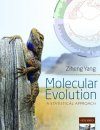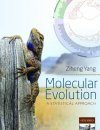![Molecular Evolution Molecular Evolution]()
Click to have a closer look
About this book
Contents
Customer reviews
Biography
Related titles
About this book
Studies of evolution at the molecular level have experienced phenomenal growth in the last few decades, due to rapid accumulation of genetic sequence data, improved computer hardware and software, and the development of sophisticated analytical methods. The flood of genomic data has generated an acute need for powerful statistical methods and efficient computational algorithms to enable their effective analysis and interpretation. Molecular Evolution: A Statistical Approach presents and explains modern statistical methods and computational algorithms for the comparative analysis of genetic sequence data in the fields of molecular evolution, molecular phylogenetics, statistical phylogeography, and comparative genomics.
Written by an expert in the field, Molecular Evolution: A Statistical Approach emphasizes conceptual understanding rather than mathematical proofs.
Molecular Evolution: A Statistical Approach is enlivened with numerous examples of real data analysis and numerical calculations to illustrate the theory, in addition to the working problems at the end of each chapter. The coverage of maximum likelihood and Bayesian methods are in particular up-to-date, comprehensive, and authoritative. This advanced textbook is aimed at graduate level students and professional researchers (both empiricists and theoreticians) in the fields of bioinformatics and computational biology, statistical genomics, evolutionary biology, molecular systematics, and population genetics.
Molecular Evolution: A Statistical Approach will also be of relevance and use to a wider audience of applied statisticians, mathematicians, and computer scientists working in computational biology.
Contents
1. Models of nucleotide substitution
2. Models of amino acid and codon substitution
3. Phylogeny reconstruction: overview
4. Maximum likelihood methods
5. Comparison of phylogenetic methods and tests on trees
6. Bayesian theory
7. Bayesian computation (MCMC)
8. Bayesian phylogenetics
9. Coalescent theory and species trees
10. Molecular clock and estimation of species divergence times
11. Neutral and adaptive protein evolution
12. Simulating molecular evolution
Appendixes
References
Customer Reviews
Biography
Ziheng Yang is currently RA Fisher Professor of Statistical Genetics in University College London. He obtained a Ph. D in agronomy in Beijing Agricultural University in 1992. Since then he held a few postdoctoral researcher positions in the UK and US. He joined UCL in 1997, first as a lecturer, then reader and professor. He teaches statistical genetics. He has published about 150 research papers and book chapters in molecular evolution, phylogenetics, population genetics, and computational biology. His program package paml is widely used in the molecular evolution community. He was elected a Fellow of the Royal Society in 2006.



































